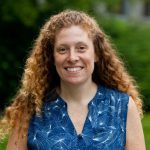


This Member Update was provided by Laurie Allen, Coordinator of Digital Scholarship Research and Services; Michael Zarafonetis, Digital Scholarship Librarian; and Terry Snyder, Librarian of the College, Haverford College Libraries.
Digital Scholarship at Haverford
Formed in 2011, Digital Scholarship in the Haverford Libraries supports and promotes hybrid scholarship that integrates digital tools and methods with traditional scholarly inquiry and research in a liberal arts context. The scholarly question remains at the center of this work, which is informed and aided by technology in new and exciting ways. The close reading of original texts that remains an important part of scholarly research can now be supplemented by new techniques like data visualization, textual encoding and analysis, and mapping to ask new questions of existing materials. Haverford DS supports the use of these tools and techniques to help faculty in their approaches to research and classroom pedagogy, and to support students in their development as researchers and critical thinkers.
New and important curricular, co-curricular, and research projects are emerging. A few recent faculty projects on which library colleagues are partnering and supporting include:
- Associate Professor of Linguistics, Brook Danielle Lillehaugen’s research project, Ticha, a digital text explorer for Colonial Zapotec which brings linguistic information together with transcription, translation, and TEI encoding of colonial era Mexican texts written in the Valley Zapotec language
- Classic’s Professor Bret Mulligan’s “The Bridge,” a teaching tool that helps one create and learn vocabulary in Greek or Latin;
- Professor Barak Mendelsohn’s “Global Terrorism Research Project” which includes a resource section and an index to al-Qaeda Statements since 1984;
- Economics Professor Shannon Mudd’s “Mapping Microfinance,” a project that combines branch-level locational data for microfinance institutions with social, economic and demographic information for developing countries; and
- Professor Craig Borowiak’s research on the Solidarity Economy
In addition to working on these faculty research projects and in courses, students are asking their own questions and shaping their own projects. For example, Rachel Berger (Swarthmore ’16) developed an impressive Omeka exhibit entitled, “The Second Generation: Boy Heroes in American Dime Novels, 1860-1910” to help us promote a new collection. Another student project developed by Cormac Rada (’17), Brandon Smith (’16), and Andrew Kafker (’17) is the Cope Evans Project. Here the students combine archival research with data visualization to explore the growth of relationships and networks among two prominent Quaker families during the long nineteenth century. The project includes interactive maps, letter subject analyses, and other visualizations of Industrial Age Philadelphia.
Student interest in multimodal learning is also seen in our recently launched Digital Scholarship Fellows Program. The Libraries are partnering with the Writing Center, the Center for Career and Professional Advising, and the Office of Academic Resources in offering the fellowship in which students meet monthly to explore theoretical and technical elements of digital scholarship. The selected students will collaborate with Haverford professor Paul Farber on a project exploring twenty first century monuments, which includes the opportunity to participate in the design and development of an interactive “Monument Lab” to be staged near Philadelphia’s City Hall.
In all the exciting work of the Haverford Libraries, we are also privileged to collaborate with librarians and information technologists at Bryn Mawr College and Swarthmore College. Further we all support the Tri-College Digital Humanities effort to advance research and teaching using new media and computer technologies.
As part of our collaboration with Tri-College colleagues, Haverford is also committed to building a robust digital library of digitized collections and born-digital materials. Haverford Scholarship, an instance of BePress Digital Commons, was launched in 2013 in an effort to aggregate, preserve, and showcase the scholarly work of Haverford College faculty on an open access platform. Haverford student theses, the college’s digital archives, and other archival materials are stored and made available through a Tri-Co DSpace instance, which in addition to archiving these materials also connects them to digital scholarship projects. Many of our Special Collections materials are available via a Tri-Co CONTENTdm installation, allowing Haverford students and the public to explore the college’s manuscript and photograph collections. The current landscape of Haverford’s digital library initiatives are being reviewed in an effort to explore ways to streamline and strengthen this presence.
Why We Joined DLF
Appreciating the changing nature of scholarship and both the potential challenges and opportunities present in technology, it did not take long to reach out to colleagues at other schools to find intersecting interests, share experiences, and learn from each other. Perhaps one of the more formative and generative opportunities to build out collaborations for Haverford College came at the 2013 Digital Library Forum meeting, where Coordinator for Digital Scholarship and Services Laurie Allen participated in the drafting of this Manifesto on Digital Scholarship at Liberal Arts Colleges.
At that meeting, Neil McElroy gathered colleagues from leading Liberal Arts Colleges at a DLF preconference session to share ideas and explore best practices. The gathering, facilitated by Rachel Frick, spawned a series of conference sessions as well as an executive briefing written in collaboration with Richard Fyffe of Grinell and Gina Seising at Bryn Mawr College. It continues to inform our thinking and inspire a range of cross-institutional collaborations; we offer it below for others’ consideration.
Ultimately the richness of that gathering reinforced the value of the DLF in advancing best practice in digital scholarship as well as connecting theorists and practitioners with one another. We would urge institutions considering membership in the DLF, particularly Liberal Arts Colleges, to join! It is an important way to keep your finger on the pulse of emerging digital scholarship trends and best practices.
Digital Scholarship and Liberal Arts Colleges meeting Executive Briefing
